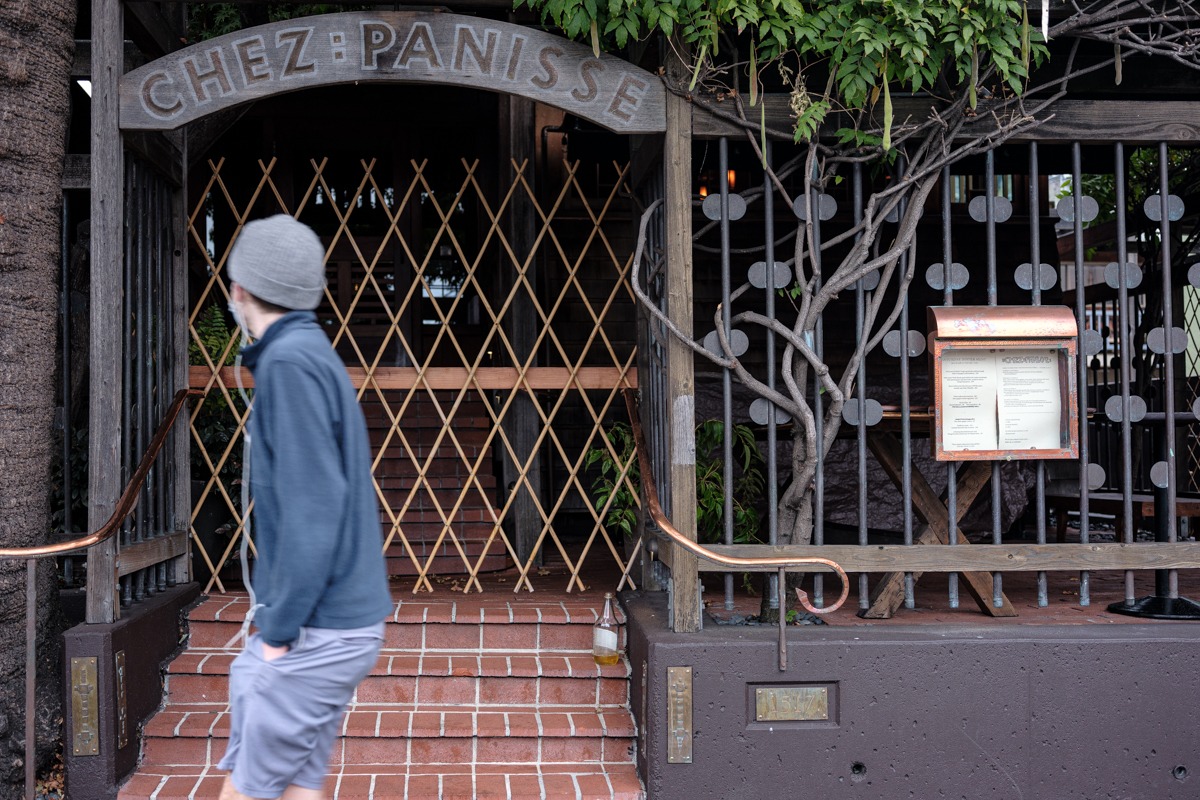COVID changed Chez Panisse, but Alice Waters is still taking care of local farmers
The iconic Berkeley restaurant’s new pandemic model works to preserve its suppliers and workers who make its farm-to-table philosophy possible.

A pedestrian walks past the entrance of Chez Panisse early Sunday Morning. October 25, 2020. Photo: Pete Rosos
When Chez Panisse closed its doors in mid-March at the onset of the pandemic, staff cleaned out the refrigerators and divvied up ingredients that would ordinarily be the stars of its meticulous dishes.
At the time, Chez Panisse founder Alice Waters had no idea what was in store for the famed 49-year-old Berkeley restaurant or its 100 furloughed staff members, but she did know the next order of business — attending to the farmers who supply Chez Panisse.
“It’s always been our priority to take care of our farmers,” said Waters. “To absolutely buy everything we can from everybody who has provided food for the restaurant over these 49 years.”
Since 1971, Waters has championed American fine dining as the procurement of local, organic ingredients showcased at their seasonal peak. With Chez Panisse, she created a symbiotic micro-economy between the restaurant and the local farmers that supply it. Seven months after COVID-19 closed the institution, Waters and her remaining staff readily accept that Chez Panisse must reinvent itself, and quickly, to preserve the suppliers and workers who make its farm-to-table philosophy possible.
Chez Panisse depends on its farms; its farms depend on Chez Panisse
According to general manager Varun Mehra, Chez Panisse buys from about 80 farms. “If we just close up shop, then we’re not buying from, not only our farm [Cannard Family Farm], but also River Dog, Star Route Farms, La Tercera, Mariquita, Dirty Girl,” he said.
On the first weekend of the lockdown, the restaurant debuted its Sunday market, selling produce from Cannard Family Farm. Produce was sorted into farm boxes and sold in the parking lot of the neighboring post office. It was a success, so the restaurant continued the events weekly, expanding its offerings to include other Chez suppliers, selling between 150 and 200 boxes per week.

Farm boxes at the Chez Panisse Sunday market feature produce from farms that supply the restaurant, like Cannard Family Farm, Dirty Girl Produce, River Dog Farm, Star Route Farms, La Tercera and Mariquita Farm. Photo: Pete Rosos
The pivot actually resulted in an increase in the amount of produce Chez Panisse ordered from farms — a welcome development for growers who otherwise scrambled to make up for the loss of the restaurant market.
“The orders we get from Chez Panisse are the biggest orders we’re getting,” said Joe Schirmer, owner of Dirty Girl Produce. The farm box sales account for three to six times the amount he would normally supply to the restaurant.
Ross Cannard, who took over Cannard Family Farm from his father Bob Cannard last year, said that the Chez Panisse farm box has been a lifeline for his business. The farm previously only supplied to Chez Panisse and since the pandemic, has added a direct-to-consumer farm box in Sonoma.
“They’ve made a huge effort to keep their farmers going,” Cannard said, noting that when his farm suddenly had to make boxes for the Sunday event, Chez Panisse staffers volunteered to help him pack them. “I always felt like they had my back.”
A new model for Chez Panisse
The Sunday market quickly grew a following. In addition to selling some of the freshest produce, it became a pandemic-safe social occasion for people.
“A lot of people say that it’s the one time of the week that they get dressed up,” said Mehra. “It’s become an outing.”
However, the once-a-week Sunday market didn’t allow Chez Panisse to rehire many of its furloughed staff. In July, Chez Panisse filed a lawsuit against AMCO Insurance Company for denying coverage for business losses during the pandemic. At the time, Waters said AMCO acted in bad faith to deny her insurance claim and that the livelihoods of her employees and suppliers were in jeopardy because of its refusal to pay. With no help from the insurer and no end in sight for the lockdown, Mehra needed to act fast to create a new model for Chez that could last a year or two.
“The more revenue we have coming in then the more options we have to make decisions to take care of people,” Mehra explained.
In May, Chez Panisse added a Friday takeout day, where diners could order menu and pantry items, like sandwiches, soups, wine and spit-roasted chickens. Chefs began tinkering with classic Chez Panisse recipes to find ways to adapt them for takeout. Their wood-fired pizzettas, for example, have a new dough recipe and the pies are larger. The chefs learned to highlight foods that are meant to be eaten at room temperature like salmon or niçoise salad. They also developed dishes that can be reheated at home at a low temperature in the oven, like quail and duck. The change was a challenge.
“We do something very close to comfort food, so being able to give that feeling to the people who are getting our food in a box is something that has been hard for us,” said Chez cook Dan Alterman.

Individual off-the-shelf produce displayed at the Chez Panisse Sunday market. Photo: Pete Rosos
On Oct. 12, the restaurant announced the start of “a new chapter at Chez Panisse,” with to-go lunch and dinner, sold Wednesday through Sunday. Dinner can be ordered a la carte five days a week, as it was served in the café upstairs. And from Thursday to Saturday, three-course dinners are served to-go, echoing the downstairs dining experience. Chez’s staff has climbed back up to 50 employees.
Recent prix fixe dinners have completely sold out. And that’s good because, according to Mehra, Chez Panisse won’t be dabbling in dine-in service anytime soon. The bones of the restaurant are a California bungalow house, he said, meaning space is tight and there is little ventilation. The restaurant is considering starting outdoor service, but it wouldn’t be until next spring in a newly built parklet.
Still, Mehra says that Chez Panisse isn’t in the clear.
“It’s not like we’re going to get repossessed in the next six months, but that doesn’t mean everybody’s not going to eventually get laid off,” he said. “Hopefully this works and is enough to maintain what we need it to maintain for now.”
Waters seeks change beyond Chez Panisse
While her restaurant fights to preserve the micro-economy it created over nearly five decades, Waters has her eyes set on helping farmers at a larger level, beyond her mother ship. With laurels gained through her 25-year-old Edible Schoolyard Project — a garden, kitchen and cafeteria curriculum that started in Berkeley and that has sprouted into an influential program around the world — Waters is currently in conversation with the University of California, with the hopes that its campuses will source food directly from local farmers instead of industrial producers.
Starting this year, each UC campus foodservice operation plans to source 25% of its food from sustainable sources by 2030. For Waters through, this is not lofty enough; she challenges UC to purchase 100% of its food from sustainable sources by 2025, the same year the system intends to achieve net carbon neutrality.
Going with 100% sustainable food sources, in her view, would have broad economic, health and social impacts in California, like regenerating biodiversity, returning carbon into the soil, improving wages for farmworkers, stimulating small businesses and improving the health, wellbeing and education of students.

A basket of pumpkins along with pumpkin pie recipe flyers at the Chez Panisse Sunday market. Photo: Pete Rosos
Waters also wants UC to convert more of its land into gardens and farms for hands-on learning. She anticipates opening a cooking school in the new UC Berkeley dorm on Oxford Street at University Avenue.
“This kind of deep work is what we need,” Waters said. “We can give all of our money to the people who are taking care of the land for the future.”
For Waters, the UC system could be a pioneer for other public schools.
“I know it sounds trite, but food is about love,” she said. “Our kids really need to feel that and that they are taken care of.”
The project also brings her full circle back to her early days in Berkeley, as a student in the UC system. Waters began her undergraduate studies at UC Santa Barbara before transferring to UC Berkeley.
“To work with the University of California is my dream,” she said. “I mean that’s where it all began for me in 1964, so it’s continuing the revolution from that point.”
But this time, Waters said, “we have to go all the way.”







